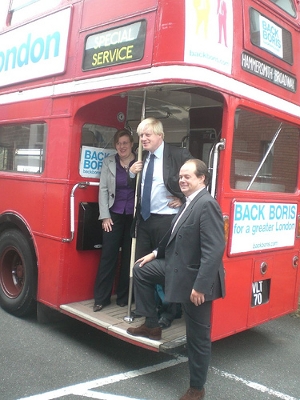 Electoral success depends on the delivery of political messages and analysing the comparative oratorical skills of Ken Livingstone and Boris Johnson provides an insight into who will emerge as the victor in the upcoming mayoral election. Andrew Crines argues that Boris has the edge, but Ken still has cards to play.
Electoral success depends on the delivery of political messages and analysing the comparative oratorical skills of Ken Livingstone and Boris Johnson provides an insight into who will emerge as the victor in the upcoming mayoral election. Andrew Crines argues that Boris has the edge, but Ken still has cards to play.
As the race enters its final stages, motivating the electorate further into engaging with the London Mayoral election requires effective political communication. For the London electorate, this sideshow is of profound importance, yet the electioneering remains of little interest. Why? Because of a degree of malaise over the seemingly ceaseless feud between these two high profile figures, both precluded from their respective mainstreams by their outward enmity to respective Labour and Conservative elites. It is a battle fought on personalities, a battle where few examine the policies.
Of course, a clear and distinctive policy agenda is vital; any politician needs rhetoric. Yet, to be truly effective, this alone is inadequate. Rather, it is the delivery that is equally vital – rhetoric and oratory combined are essential in garnering electoral success.

A clear curiosity of the Mayoral election is its contenders. Ordinarily, it is necessary for the incumbent to defend their record against the incoming parvenu, thus framing ‘tried and tested’ against ‘new and exciting’; experience versus inexperience; novelty against custom, with elite rhetoric giving the electorate a clear policy choice between these opposites. Yet, the 2012 election garners its distinctive character from both the resident player and challenger being textured by a record in office. Both Boris Johnson and Ken Livingstone can claim a record of success and failure, both can claim competence and accuse the other of incompetence as required.
Each have a record to defend, each can critique their adversary on the same basis. Their rhetoric, therefore aims to frame the other as either the pretender or imposter king, both attempting to court the blessing of a disinterested electorate, yet in the process risking perpetuating the dynasty characteristic advanced by critics. Must it always be Boris and Ken? To some extent the answer is yes, however only insomuch as they are distinctive personalities, making this skill a prerequisite for their successors. That, however, is an analysis for another place as here we pose the question: who will the electorate select?
Importantly, policies and pledges are effectively extraneous for this election. The electorate is fully aware that Johnson “inherited a city with significant problems: rising crime, a transport system creaking at capacity and suffering from years of neglect, waste, inefficiencies, a breakdown of community relations and empty, unfunded promises”. Equally, the electorate knows that Livingstone “wants to be Mayor for one overriding reason”, and that is “to protect Londoners from the recession and the effects of government policies”. The electorate would find positions contrary to these surprising. As such, this election is not going to be won based on who can invent the most ingenious policy to defend London against social ills, but rather who can communicate those broad intentions most convincingly. Consequently, the content of their speeches – the rhetoric – for the contenders is not as significant as how that is conveyed to the electorate. Therefore, the candidate most likely to secure the throne will be the one able to communicate their position through effective oratorical delivery.
In the school of oratorical analysis, two key communicative methods are most appropriate for this Mayoral election: deliberative and epideictic oratory. The first relates to considered engagement with audiences, whilst the second revolves around the performance of the speaker. The first is a prerequisite for any political figure, given it is the means by which the logic of their policies is expressed. Consideration, thought, and even ideology can be drawn upon through this in order to appeal to the intellect of the listener. As the preferred means of political discussion, it is regarded as a given.
Yet the distinctive oratorical approach which favours Johnson derives from the second method. Epideictic oratory is the ability to command a display, to perform to the assembled masses, even to amuse. With this style of delivery, Johnson is able to demonstrate his suitability for the performance by placing his well-chosen rhetoric into such a performance. This is not to suggest that Livingstone does not have this skill, but rather Johnson is more effective in deploying it. Indeed, Livingstone has utilised this effectively historically.
In 2000 and 2004, this process enabled Livingstone to take the crown against the unconvincing Steven Norris. Norris lacked a clear communicative ability and rhetorical framework. Also, it must not be forgotten that in 2000 Livingstone’s epideictic impact was enhanced further by the deliberative New Labour establishment figure, Frank Dobson. Moreover, performance is enhanced by oratorical failures on the opposing side. Yet against Johnson, Livingstone’s oratorical skills are left wanting. Here, it is he who is the ineffective contender; it is he who has become the pretender to the throne. Therefore, there is little expectation that Livingstone will perform much better in 2012 than in 2008, given that the communicative capital resides with the incumbent.
The most important question is, of course, what is to be done? For Livingstone to emerge as the more effective communicator, he needs to enhance his oratory by taking the fight to Johnson’s epideictic style. Should Livingstone force the debate onto an arena where deliberative oratory is required, Johnson will still prove effective however it will remove the epideictic dynamic which plays more to Johnson’s strengths. For Johnson, ensuring the debate enables him to utilise both will ensure he remains victorious. Consequently, from an oratorical perspective the analysis favours Johnson, but Livingstone still has cards to play.
Please read our comments policy before posting.
Note: This article gives the views of the author, and not the position of the British Politics and Policy blog, nor of the London School of Economics.
Dr Andrew Crines is a lecturer and researcher at the University of Huddersfield, specialising in oratorical and rhetorical analysis across British Politics. Dr Crines has written a monograph entitled ‘Michael Foot and the Labour Leadership’, and is currently editing a volume with Dr Richard Hayton (Huddersfield) on Oratory in the Labour Party.







